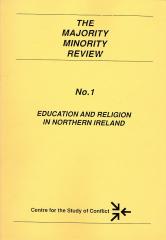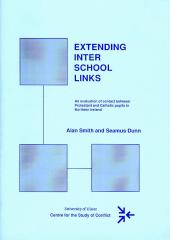
|
||||||||||||||||||||||||||||||||||||||||||||
|
"A community relations programme, designed to promote tolerance as a core value of our society, is not an optional extra in education. Its basis is the shared citizenship of a community, based on justice and equality for all." DENI
|
Education and Community Relations Practice
This section will deal with Education and Community Relations (CR) and the main issues raised throughout the questionnaire, semi-structured interview and workshop phases of the CRPR project. A comprehensive reading list, accredited courses, contact details and relevant Internet links section is also included.
Participants highlighted the benefits to be gained from following up CR policy statements by institutions/organisations with positive actions. The University of Ulster and the NUS/USI have formulated statements concerning their approach towards community relations issues that can be found at: Participants pointed out that these statements could only be of benefit if suggestions are available to the public and are followed up by positive actions. In addition many of the participants stated that all too often in the past the benefits to be gained by the employment of good research have been lost between the recommendation and implementation phases. Much of the discussion in the CR workshops focused around the question of teachers and core competencies. Many newly qualified teachers in Northern Ireland receive inadequate training in issues such as Education for Mutual Understanding (EMU) see Smith and Robinson (1996), EMU, The Initial Statutory Years published by the Centre for the Study of Conflict (http://cain.ulster.ac.uk/csc/cscpub.htm). Some of the workshop participants stated that in comparison they would not feel comfortable if their children were being educated in English by someone without the relevant training. This view on inadequate training highlights the fact that many participants felt that there should be no prioritising between other subjects and CR initiatives. The general feeling was that in order for initiatives such as EMU to work the whole school ethos should have a genuine commitment to the core principles of CR issues within the educational system. While respecting the pressures that teachers are already under it was recommended that CR issues should be built into the curriculum as a core competency and assessed through the school inspection system. It was also suggested that there be some provision set within the interviewing process for teaching staff to identify those who demonstrate qualities that may be suited to the delivery of CR within the educational system. Participants also suggested that mainstreaming CR within the educational system should not only be done by targeting new teachers, but also by training up experienced teachers already working within this system. Some participants suggested that responsibility for this process should not lie solely with the schools/colleges and further examination of existing policy, by Department of Education Northern Ireland (http://www.deni.gov.uk/), was needed. Similarly even if teachers embrace the objectives of CR within schools they have to have some form of support system that prevents them from feeling isolated. It was pointed out that many teachers might be afraid to open a can of worms and therefor find themselves out of their depth when dealing with CR. It is for this reason that teachers need mechanisms that will address their fears and apprehensions in this area.
The vehicles that are currently being employed for the delivery of CR within schools may need further examination. Some participants stated that there may be more benefit to be gained if issues such as EMU were dealt with in school assembly or through internal poster campaigns as well as on a class by class basis. However the value of a two hour session on EMU per week delivered over eight weeks was questioned and many felt that this was an accurate representation of how the educational system approaches CR within schools, colleges and universities. One of the over riding themes that surfaced throughout this research was the use of language currently employed within the CR sphere. Many did not understand why the language currently in use was more suited to academics rather than practitioners and/or participants. The general consensus was that language should be simplified and the use of jargon should be kept to a minimum. Again it was pointed out that recommendations arising from research such as the Community Relations Practice Project have to be backed up by positive actions. This would not only benefit CR in general but also creates the atmosphere for information sharing and the progression of all elements of CR in parallel. It was also stated that there may be real benefit in securing stronger links between the formal and youth and community sectors. There are currently plans to ask members of the voluntary sector to teach modules in schools dealing with the social sciences. It was thought that this idea should be developed further and may merit in-depth research. When discussing success and how it can be maximised particular reference was made towards observing non-integrated schools and their approach towards CR and education. It was thought that if those schools moving towards transformation to an integrated environment introduced support mechanisms for children and staff this would be perceived as a positive step in the right direction. It was thought that this is the area that merited priority attention. It was also stated that it was not enough to have a few teachers who were interested in EMU and CR in a non-integrated environment but that there must be top down as well as bottom up commitment working in tandem if real value is to be gained. Workshop participants stated that evidence of progress in this area would demonstrate a growing respect for CR within schools, colleges and universities which in turn would be an indicator that every stakeholder, from management committee to parent, showed a willingness to back up aspirations with actions. It was also suggested that networks between establishments undertaking similar initiatives should be strengthened, personal biographies must be shared.
It was also stated that further contact between children from different backgrounds was a good indicator of success it was highlighted that this was dependant on factors like if the initiative was sustainable, had an element of independent follow-up work and the friendships had a real chance of lasting. Some members of the workshop groups stated that they felt EMU and cross-community contact didnt amount to anything more than glorified school trips. It was also pointed out that the community in which the participating schools where situated could also notice if the initiatives where working. Transport is one of the areas that children from different schools can come into contact with each other without supervision, whether this interaction can happen on a day to day basis without incident, particularly if there have been difficulties in the past, this could act as an indicator of success. Police crime statistics of the area in question could be monitored in order to gauge project impact. Summary of Main Points on CR and Education:
Useful Publications Aspects of Education Series, Education for Northern Ireland: Christian Perspectives, Number 52, 1995. Darby. J, Murray. D, Batts. D, Dunn. S, Farren. S, and Harris. J, (1989), Education and Community In Northern Ireland: Schools Apart? University of Ulster. Dunn. S and Smith. A, (1989), Inter School Links, Coleraine: University of Ulster. (ISBN 1-871206-60-X) 71 pages £4.00 Dunn. S, (ed.), (1996), Pluralism in Education: Conference Proceedings 1996, Pluralism in Education Standing Conference. (ISBN 1 87232 712 5) 295 pages £10.00 pbk Dunn. S, Darby. J and Mullan. K, (1989, reprinted double issue), Schools Together?, Coleraine: University of Ulster. (ISBN 1-871206-91-X) 120 pages £5.00 Fraser. G and Morgan. V, (1999), In the Frame - Integrated Education in Northern Ireland: the implications of expansion, Coleraine: University of Ulster. (ISBN 1 85923 133 0) 118 pages £6.00
Gallagher. A, (1995, second edition), Majority Minority Review 1: Education in a Divided Society, Coleraine: University of Ulster. (ISBN 1-85923-003-2) 81 pages £4.00 Moffat. C, (ed), (1994), Education Together for Change: Integrated Education and Community Relations in Northern Ireland Belfast. Morgan. V, Dunn. S, Cairns. E and Fraser. G, (1992), Breaking The Mould: The Roles of Parents and Teachers in the Integrated Schools in Northern Ireland, Coleraine: University of Ulster. (ISBN 1-871206-43-X) 97 pages £3.00 Morrow, D and Wilson, D, (1996), The Importance of Informal Adult Education and Reconciliation, in Ways Out Of Conflict: Resources for Community Relations Work, Corrymeela Press. Murray, D. Smith, A. and Birthistle, U., (1997), Education in Ireland: A Comparison of the Education Systems in Northern Ireland and the Republic of Ireland, Irish Peace Institute Research Centre, Limerick. Smith. A and Robinson. A, (1992), Education For Mutual Understanding- Perceptions and Policy, Coleraine: University of Ulster. (ISBN 1-871206-38-3) 95 pages £3.00 Smith. A and Robinson. A, (1996), Education for Mutual Understanding: The Initial Statutory Years, Coleraine: University of Ulster. (ISBN 1-85923-0474) 107 pages £5.00
Smith. A, (1994), The EMU Promoting School - A Report on a Conference on Education for Mutual Understanding and Cultural Heritage, Coleraine: University of Ulster. (ISBN 1-85923-095-4) 31 pages £?? Tyrrell. J, (1995), The Quaker Peace Education Project 1988-1994: Developing Untried Strategies, Coleraine: University of Ulster. (ISBN 1-85923-007-5) 122 pages £5.00 COVERSCAN Tyrrell. J and Farrell. S, (1995), Peer Mediation in Primary Schools, Coleraine: University of Ulster. (ISBN 1-85923-004-0) 99 pages £5.00 Wilson. D and Dunn. S, (1989), Integrated Schools: Information For Parents, Coleraine: University of Ulster. (ISBN 1-87-1206-367) 32 pages £1.95
Information on courses will be updated regularly
Department of Education Northern Ireland (01247) 279279
Belfast Education & Library Board (01232) 564000
Southern Education & Library Board (01861) 523811
North Eastern Education & Library Board (01266) 653333
Western Education & Library Board (01662) 240240 South Eastern Education & Library Board (01232) 381188
Youth Council for Northern Ireland (01232) 643882
Youth Link Northern Ireland (01232) 323247
University of Ulster School of Education (01265) 44141 Churches Peace Education Programme (01232) 662992 Funding Organisations
Community Relations Council, 6 Murray Street, Belfast (01232) 439953
District Councils, Names and addresses available in CORPUS
Department of Education Northern Ireland, (01247) 279279
Education and Library Boards, Youth Departments (listed above)
Youth Council for Northern Ireland, Purdys Lane, Belfast (01232) 643882 This section is currently under construction and will be updated regularly
info.ccru@nics.gov.uk copyright and disclaimer |
|||||||||||||||||||||||||||||||||||||||||||
 Gallagher. A, (1989),
Gallagher. A, (1989),  Smith. A and Dunn. S, (1990),
Smith. A and Dunn. S, (1990),